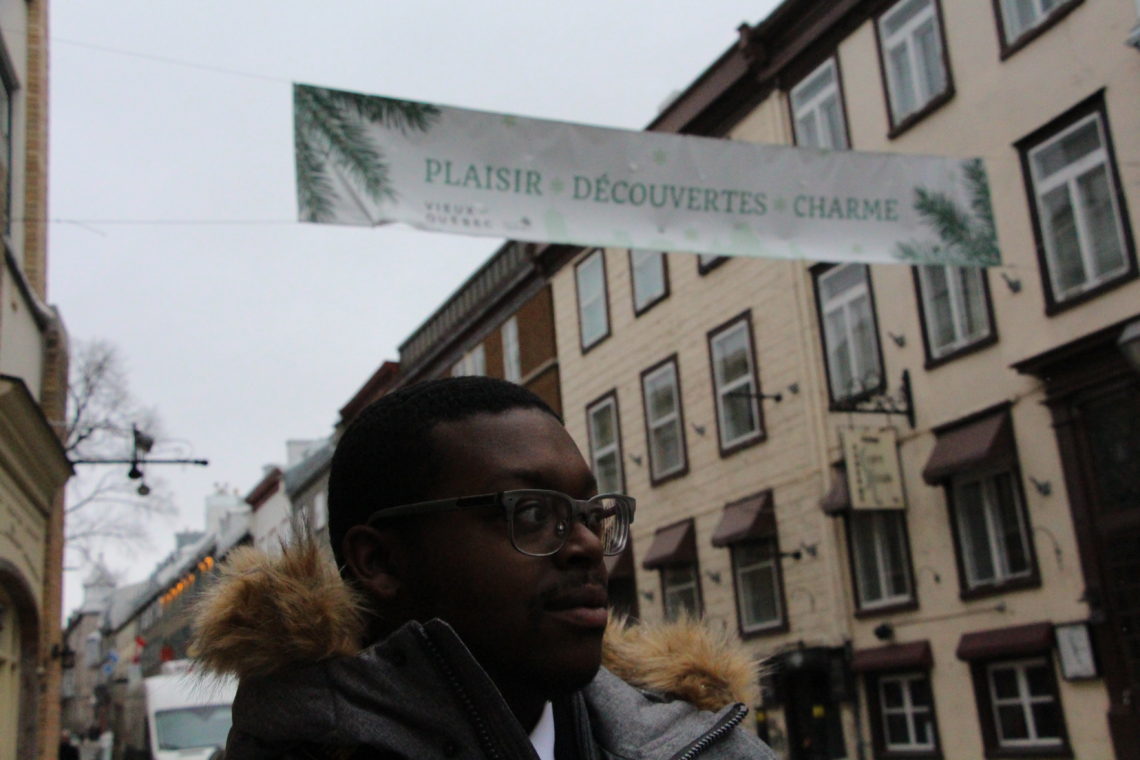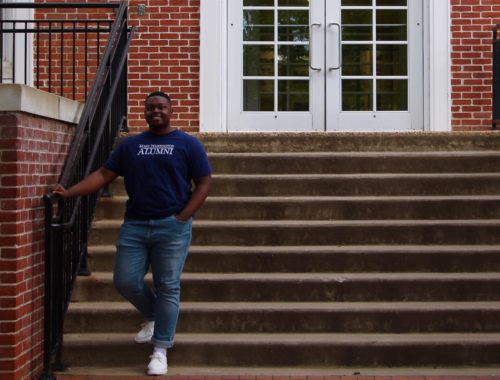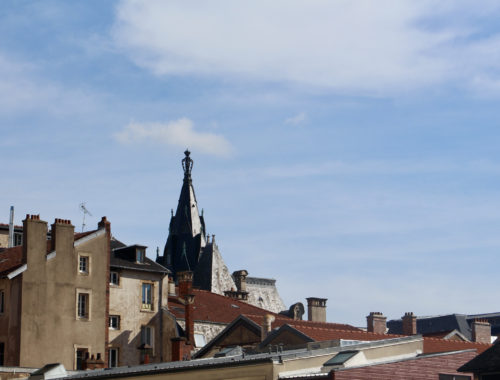
How Learning French Improved My Life Tenfold
Jalen’s French-Language Journey
2014 was a big year for me. I was a senior in high school, it’s the year that I started dating Maria, and naturally, it’s the year that she introduced me to the French language. Before we’d met, I’d dragged my heels through three years of Spanish, one year of Latin, and two years of German with absolutely nothing to show for it. For whatever reason, I hadn’t given the French language a chance, but, in the end, it didn’t matter much. Maria quickly helped me realize that having the ability to speak a foreign language was not only important and useful, but extremely cool and intriguing. Her well-established French skills and my desire to impress her became my motivations.
Shortly after we began spending time together, I decided that I, too, would learn to speak French. Because of my all-or-nothing personality, I had no choice but to learn anything and everything I could about French language and culture. I shared my new aspirations with Maria, and she was supportive from the start. My journey began in December of 2014. At this point, my French skills were non-existent, but I immediately got to work. Listening to podcasts, watching YouTube videos, writing journals, and chatting with people online were only some of the things I did along the way to fast track my language skills. Little by little, French became increasingly important to me. Becoming fluent practically became an obsession and I made it my goal to study the language in college the following year. As time went on, I studied French for hours every day. I studied French in other classes, I studied French before sporting events, and I studied French at home. It was a non-stop affair.
When the summer of 2015 rolled around, I had applied and been accepted to college, graduated from high school, and was finally getting ready to start my four-year stay at a nearby university. When the time came to take college course placement tests, the perfectionist in me aspired to place into the 300-level French classes right away. After getting my results back, I had not quite reached my lofty goal. I was, however, ecstatic to have placed into French 202, the last intermediate French class that would allow me to take advanced-level courses in French such as literature, cinema, and culture. The results of the placement exam demonstrated that I was making great progress. With only an eight-month, informal, self-directed study program under my belt and my anglophone, high-school girlfriend as my teacher, my French wasn’t too shabby.
Upon taking French 202, my first French class at the university level, I realized that the foundational French I learned was essential for me. I found that although my self-directed study program had gotten me this far, it had also left me with gaps in my knowledge. I knew when to use and how to conjugate the subjunctive form of verbs but didn’t know how to say fourchette. By the end of the class, I had filled these gaps and formed new skills, including reading longer texts, writing short essays, giving presentations, and debating. I was finally ready to move on to the more advanced classes that I’d wanted to take all along.
University continued and so did my enrollment in French courses. I was taking at least one and as many as three French classes per semester. The classes were even more satisfying because I was finally able to enroll in the same classes as Maria. The number of French classes that could fit into my schedule varied depending on what classes were available for my major, International Affairs. As Maria and I had decided to minor in French, we had to prioritize the completion of our major. One day, however, our French professor pulled us into his office to talk to us about declaring French majors. We were reluctant at first, unsure of whether we’d have the time to be double majors and graduate in four years. Fortunately, after crunching some numbers, we were convinced at that moment to declare French as our second major.
Many doors opened as a result of this decision. It was no small commitment, but it was definitely worth it in the end. Being a French major at the University of Mary Washington granted access to new scholarship money, class options, and opportunities to go abroad. I was able to secure a hefty scholarship, participate in an individual study, visit Québec, and more all thanks to the French department. Even today, doors have not stopped opening! My French major allowed me to apply confidently to and participate in the Teaching Assistant Program in France (TAPIF), a program that allows Americans a to work in France for an academic year with an English-teaching job that pays a salary! Additionally, I was able to secure the highest possible certification in the French language by sitting for the DALF C2 in June 2019.
Beginning in 2020, I pursued my master’s degree in France in Logistics and Supply Chain Management at the Université de Reims Champagne-Ardenne. I took a number of interesting courses, completed an internship and an alternance, and graduated with honors. Being a graduate student in France was a demanding experience, and I am proud to have earned my degree.
Most recently, I began my full-time job in France where I work a Logistics role in the Agri-food sector. I love that my position allows me to couple my academic passions with my personal interests, and I’m endeavoring to learn as much as I can as I start my career abroad.
In sum, my journey with French is ever-evolving. It began as a slowly-developing, self-serving enterprise and has developed over the years into a fast-paced joint effort. I know that my journey will continue far into the future and will develop in new and exciting ways. In any case, all the updates and changes will be documented here, so stick around. If you’re on a journey to French fluency or have questions about my experience, let us know!
You May Also Like

Thirteen University Classes That Made Me Fluent in French
October 30, 2019
How Mastering French Helped Me Learn Even More Languages
September 22, 2021

2 Comments
Uwe Hoche
Hi Jalen and Maria,
I stumbled upon one of your YT vidéos today, and immediately felt 40 years younger when I read that you guys live in Reims. A few things about myself to make it easier for you to understand what I mean.
I was born in Germany, went to California at the age of 17 as a foreign exchange student at a public highschool, then went back to Germany to get a German-French baccalauréat. And finally moved to France for my medical studies at the university of …. (you guessed it) Reims ! I met my wife there, and after 10 years of living and working next to Epernay we moved to Auch in the South-West (département du Gers) where we have now been living for 18 years or so.
My study years in Reims were very tough in the beginning but became more and more enjoyable as I made friends amongst my fellow students. I had a few experiences reminding your “Trump issue”. Only in my case it was about nazis and Hitler. Not very “agréable”. Over the years, people got to know me and I completely lost my German accent, so these questions became less common.
Now, living here in rural Gers, I realize a few things I wish I had known back then : first, la Marne is a department known for rather unfriendly people (of course, that too is a generalization and a cliché…). When you go to départements like les Ardennes, la Lorraine, and le Gers you find people that enjoy speaking to you without asking stupid questions, people who don’t give a damn thing about where you’re from as long as you are smiling back to them. Secondly, and it took me a while to understand that, in order to really enjoy the experience you need to live like a French which means getting rid of many of your own standards and routines. That doesn’t mean accepting everything without criticism , but giving it a thorough try every time possible. There are some things I just don’t understand even today after 38 years living in this country, but then when I go back to Germany that’s true too. Last, but far from least, learning foreign languages and spending time in foreign countries, like you guys do, has never been so necessary as today in a period where globalization, climate changes and a new renaissance of nationalistic sentiments are creating a climate of fears and negative feelings. So, whatever questions people ask, every exchange of ideas is one tiny steps toward better global understanding among people and nations. Hopefully, more and more people will try to live abroad and to get a feel of other cultures, so that maybe some time in the near future kindness can replace suspicion among nations.
I wish both of you a pleasant stay in Reims (give the smiling angel a hug for me)
Kindest regards
Uwe
Jalen & Maria
Hello, Uwe. We loved reading your comment about your experiences in France and are always happy to find others who love Reims as much as we do! Thank you for taking the time to share your insight, and we’ll say hi to the smiling angel for you next time we’re at the cathedral.